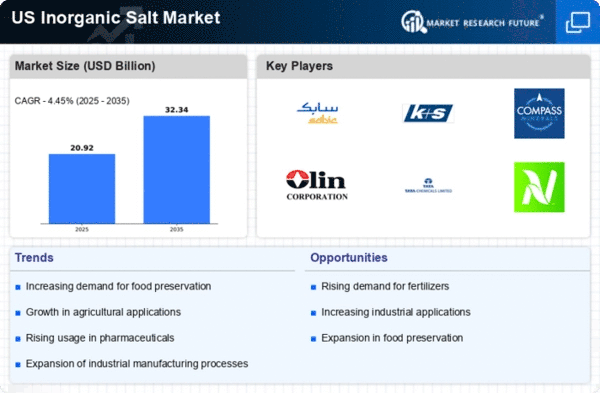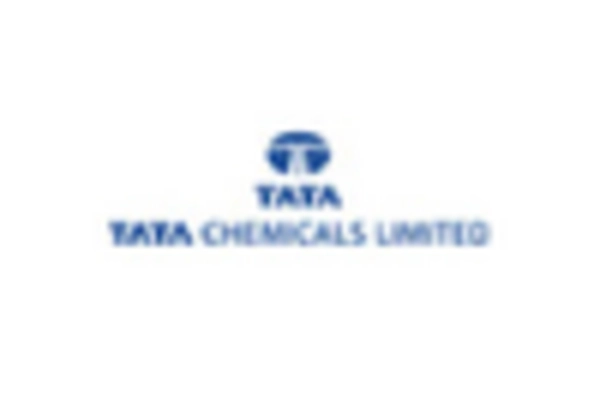-
SECTION I: EXECUTIVE SUMMARY AND KEY HIGHLIGHTS
-
EXECUTIVE’S HANDBOOK
-
The Top Performing Segments
-
Key Trends Summarized
-
Pricing Outlook
-
Strategic Insights
-
Who are the Key Players in the Market?
-
SECTION II: SCOPING, METHODOLOGY AND MARKET STRUCTURE
-
MARKET INTRODUCTION
-
Definition
-
Report Segmentation & Scope
-
Regional & Country Level Coverage
-
Why you need this report?
-
RESEARCH METHODOLOGY
-
Research Process
-
Secondary Research
- Data Mining & Condensation
- Sources (Associations, Organizations, Magazines, Paid Databases)
-
Primary Research
- Sample Size (Demand-Supply, Company Type, Designations, Region)
- Sources
-
Factorial Analysis & Approach Setting
-
Estimation & Forecast Models
-
Pricing Baskets
-
Analyst Hours & Team
-
SECTION III: QUALITATIVE ANALYSIS
-
MARKET DYNAMICS
-
Introduction
-
Growth Parameters Mapped - Drivers
- Rising consumption of agricultural goods in developing countries
- Increase in industrial establishments around the world
-
What are the challenges faced by Industry Participants?
- Fluctuations in potash ore prices
-
Opportunities
- Demand from animal feed industry
- Usage in novel industries
-
Regulatory Update
-
Impact Analysis of COVID-19
- Impact on Supply Chain of Potash Ores
- Impact on Market Demand of Potash Ores
-
MARKET FACTOR ANALYSIS
-
Supply/Value Chain Analysis
- Participants
- Value Percolation Across the Chain
- Integration Levels
- Key Issues Addressed
-
Porter’s Five Forces Model
- Bargaining Power of Suppliers
- Bargaining Power of Buyers
- Threat of New Entrants
- Threat of Substitutes
- Intensity of Rivalry
-
Pricing Scenario, By Region
-
SECTION IV: QUANTITATIVE ANALYSIS
-
GLOBAL POTASH ORES MARKET, BY MINERAL EXTRACTED (USD MILLION)
-
Introduction
-
Potassium Chloride
- Global Potash Ores Market Size: Market Estimates & Forecast, By Potassium Chloride, 2018-2032
-
Potassium Hydroxide
- Global Potash Ores Market Size: Market Estimates & Forecast, By Potassium Hydroxide, 2018-2032
-
Sodium Chloride
- Global Potash Ores Market Size: Market Estimates & Forecast, By Sodium Chloride, 2018-2032
-
Others
- Global Potash Ores Market Size: Market Estimates & Forecast, By Others, 2018-2032
-
GLOBAL POTASH ORES MARKET, BY END-USE INDUSTRY (USD MILLION)
-
Introduction
-
Agriculture
- Global Potash Ores Market Size: Market Estimates & Forecast, By Agriculture, 2018-2032
-
Metallurgy
- Global Potash Ores Market Size: Market Estimates & Forecast, By Metallurgy, 2018-2032
-
Chemicals
- Global Potash Ores Market Size: Market Estimates & Forecast, By Chemicals, 2018-2032
-
Others
- Global Potash Ores Market Size: Market Estimates & Forecast, By Others, 2018-2032
-
GLOBAL POTASH ORES MARKET, BY REGION (USD MILLION)
-
Introduction
-
North America
- North America Potash Ores Market Size: Market Estimates & Forecast, By Country, 2018-2032
- North America Potash Ores Market Size: Market Estimates & Forecast, By Mineral Extracted, 2018-2032
- North America Potash Ores Market Size: Market Estimates & Forecast, By End-Use Industry, 2018-2032
- US
- Canada
- Mexico
-
Europe
- Europe Potash Ores Market Size: Market Estimates & Forecast, By Country, 2018-2032
- Europe Potash Ores Market Size: Market Estimates & Forecast, By Mineral Extracted, 2018-2032
- Europe Potash Ores Market Size: Market Estimates & Forecast, By End-Use Industry, 2018-2032
- Germany
- France
- UK
- Spain
- Italy
- Rest of Europe
-
Asia-Pacific
- Asia-Pacific Potash Ores Market Size: Market Estimates & Forecast, By Country, 2018-2032
- Asia-Pacific Potash Ores Market Size: Market Estimates & Forecast, By Mineral Extracted, 2018-2032
- Asia-Pacific Potash Ores Market Size: Market Estimates & Forecast, By End-Use Industry, 2018-2032
- China
- India
- Japan
- South Korea
- Rest of Asia-Pacific
-
Middle East & Africa
- Middle East & Africa Potash Ores Market Size: Market Estimates & Forecast, By Country, 2018-2032
- Middle East & Africa Potash Ores Market Size: Market Estimates & Forecast, By Mineral Extracted, 2018-2032
- Middle East & Africa Potash Ores Market Size: Market Estimates & Forecast, By End-Use Industry, 2018-2032
- GCC Countries
- South Africa
- Rest of Middle East & Africa
-
South America
- South America Potash Ores Market Size: Market Estimates & Forecast, By Country, 2018-2032
- South America Potash Ores Market Size: Market Estimates & Forecast, By Mineral Extracted, 2018-2032
- South America Potash Ores Market Size: Market Estimates & Forecast, By End-Use Industry, 2018-2032
- Brazil
- Argentina
- Rest of South America
-
SECTION V: COMPETITIVE ANALYSIS
-
COMPETITIVE LANDSCAPE
-
Introduction
-
Competition Dashboard
-
Company Market Share Analysis, 2022
-
Who are the market disruptors & innovators?
-
What strategies are being adopted by market leaders?
-
Competitive Benchmarking
-
The Leading Player in terms of Number of Developments in the Global Potash Ores Market
-
List of Key Players, By Region
-
Comparative Analysis: Key Players Financial
-
Key Developments & Growth Strategies
- New Product Launch/Service Deployment
- Merger & Acquisition
- Joint Ventures
-
COMPANY PROFILES
-
Uralkali
- Company Overview
- Financial Overview
- Product Offered
- Key Developments
- SWOT Analysis
- Key Strategies
-
BHP Billiton Ltd.
- Company Overview
- Financial Overview
- Product Offered
- Key Developments
- SWOT Analysis
- Key Strategies
-
Eurochem
- Company Overview
- Financial Overview
- Product Offered
- Key Developments
- SWOT Analysis
- Key Strategies
-
Encanto Potash Corp.
- Company Overview
- Financial Overview
- Product Offered
- Key Developments
- SWOT Analysis
- Key Strategies
-
Israel Chemical Ltd.
- Company Overview
- Financial Overview
- Product Offered
- Key Developments
- SWOT Analysis
- Key Strategies
-
JSC Belaruskali
- Company Overview
- Financial Overview
- Product Offered
- Key Developments
- SWOT Analysis
- Key Strategies
-
K+S GmbH
- Company Overview
- Financial Overview
- Product Offered
- Key Developments
- SWOT Analysis
- Key Strategies
-
PotashCorp
- Company Overview
- Financial Overview
- Product Offered
- Key Developments
- SWOT Analysis
- Key Strategies
-
Agrium Inc.
- Company Overview
- Financial Overview
- Product Offered
- Key Developments
- SWOT Analysis
- Key Strategies
-
Elemental Minerals Ltd.
- Company Overview
- Financial Overview
- Product Offered
- Key Developments
- SWOT Analysis
- Key Strategies
-
RECOMMENDATIONS & EXPERT INSIGHTS
-
What is the short-term vs long-term outlook for Potash Ores Market?
-
Who are the players to look out for?
-
What will the product mix look in coming years?
-
MRFR OFFERINGS & TEAM
-
Citations & Media
-
Our Regional Representatives
-
Related Reports
-
Our Domain Coverage
-
NOTE:
-
This table of content is tentative and subject to change as the research progresses.
-
In section 10, each company will be profiled based on the Market Overview, Financials, Product Portfolio, Business Strategies, and Recent Developments parameters.
-
Please note: The financial details of the company cannot be provided if the information is not available in the public domain and or from reliable sources.
-
-
LIST OF TABLES
-
LIST OF ASSUMPTIONS
-
POTASH ORES MARKET ESTIMATES & FORECAST, BY MINERAL EXTRACTED, 2018-2032 (USD MILLION)
-
POTASH ORES MARKET ESTIMATES & FORECAST, BY END-USE INDUSTRY, 2018-2032 (USD MILLION)
-
GLOBAL POTASH ORES MARKET, BY REGION, 2018-2032 (USD MILLION)
-
NORTH AMERICA: POTASH ORES MARKET, BY COUNTRY, 2018-2032 (USD MILLION)
-
NORTH AMERICA: POTASH ORES MARKET, BY MINERAL EXTRACTED, 2018-2032 (USD MILLION)
-
NORTH AMERICA: POTASH ORES MARKET, BY END-USE INDUSTRY, 2018-2032 (USD MILLION)
-
U.S.: POTASH ORES MARKET, BY MINERAL EXTRACTED, 2018-2032 (USD MILLION)
-
U.S.: POTASH ORES MARKET, BY END-USE INDUSTRY, 2018-2032 (USD MILLION)
-
CANADA: POTASH ORES MARKET, BY MINERAL EXTRACTED, 2018-2032 (USD MILLION)
-
CANADA: POTASH ORES MARKET, BY END-USE INDUSTRY, 2018-2032 (USD MILLION)
-
MEXICO: POTASH ORES MARKET, BY MINERAL EXTRACTED, 2018-2032 (USD MILLION)
-
MEXICO: POTASH ORES MARKET, BY END-USE INDUSTRY, 2018-2032 (USD MILLION)
-
EUROPE: POTASH ORES MARKET, BY COUNTRY, 2018-2032 (USD MILLION)
-
EUROPE: POTASH ORES MARKET, BY MINERAL EXTRACTED, 2018-2032 (USD MILLION)
-
EUROPE: POTASH ORES MARKET, BY END-USE INDUSTRY, 2018-2032 (USD MILLION)
-
GERMANY: POTASH ORES MARKET, BY MINERAL EXTRACTED, 2018-2032 (USD MILLION)
-
GERMANY: POTASH ORES MARKET, BY END-USE INDUSTRY, 2018-2032 (USD MILLION)
-
FRANCE: POTASH ORES MARKET, BY MINERAL EXTRACTED, 2018-2032 (USD MILLION)
-
FRANCE: POTASH ORES MARKET, BY END-USE INDUSTRY, 2018-2032 (USD MILLION)
-
UK: POTASH ORES MARKET, BY MINERAL EXTRACTED, 2018-2032 (USD MILLION)
-
UK: POTASH ORES MARKET, BY END-USE INDUSTRY, 2018-2032 (USD MILLION)
-
SPAIN: POTASH ORES MARKET, BY MINERAL EXTRACTED, 2018-2032 (USD MILLION)
-
SPAIN: POTASH ORES MARKET, BY END-USE INDUSTRY, 2018-2032 (USD MILLION)
-
ITALY: POTASH ORES MARKET, BY MINERAL EXTRACTED, 2018-2032 (USD MILLION)
-
ITALY: POTASH ORES MARKET, BY END-USE INDUSTRY, 2018-2032 (USD MILLION)
-
REST OF EUROPE: POTASH ORES MARKET, BY COUNTRY, 2018-2032 (USD MILLION)
-
REST OF EUROPE: POTASH ORES MARKET, BY MINERAL EXTRACTED, 2018-2032 (USD MILLION)
-
REST OF EUROPE: POTASH ORES MARKET, BY END-USE INDUSTRY, 2018-2032 (USD MILLION)
-
ASIA PACIFIC: POTASH ORES MARKET, BY COUNTRY, 2018-2032 (USD MILLION)
-
ASIA PACIFIC: POTASH ORES MARKET, BY MINERAL EXTRACTED, 2018-2032 (USD MILLION)
-
ASIA PACIFIC: POTASH ORES MARKET, BY END-USE INDUSTRY, 2018-2032 (USD MILLION)
-
CHINA: POTASH ORES MARKET, BY MINERAL EXTRACTED, 2018-2032 (USD MILLION)
-
CHINA: POTASH ORES MARKET, BY END-USE INDUSTRY, 2018-2032 (USD MILLION)
-
INDIA: POTASH ORES MARKET, BY MINERAL EXTRACTED, 2018-2032 (USD MILLION)
-
INDIA: POTASH ORES MARKET, BY END-USE INDUSTRY, 2018-2032 (USD MILLION)
-
JAPAN: POTASH ORES MARKET, BY MINERAL EXTRACTED, 2018-2032 (USD MILLION)
-
JAPAN: POTASH ORES MARKET, BY END-USE INDUSTRY, 2018-2032 (USD MILLION)
-
SOUTH KOREA: POTASH ORES MARKET, BY MINERAL EXTRACTED, 2018-2032 (USD MILLION)
-
SOUTH KOREA: POTASH ORES MARKET, BY END-USE INDUSTRY, 2018-2032 (USD MILLION)
-
REST OF ASIA PACIFIC: POTASH ORES MARKET, BY COUNTRY, 2018-2032 (USD MILLION)
-
REST OF ASIA PACIFIC: POTASH ORES MARKET, BY MINERAL EXTRACTED, 2018-2032 (USD MILLION)
-
REST OF ASIA PACIFIC: POTASH ORES MARKET, BY END-USE INDUSTRY, 2018-2032 (USD MILLION)
-
MIDDLE EAST & AFRICA: POTASH ORES MARKET, BY COUNTRY, 2018-2032 (USD MILLION)
-
MIDDLE EAST & AFRICA: POTASH ORES MARKET, BY MINERAL EXTRACTED, 2018-2032 (USD MILLION)
-
MIDDLE EAST & AFRICA: POTASH ORES MARKET, BY END-USE INDUSTRY, 2018-2032 (USD MILLION)
-
GCC COUNTRIES: POTASH ORES MARKET, BY MINERAL EXTRACTED, 2018-2032 (USD MILLION)
-
GCC COUNTRIES: POTASH ORES MARKET, BY END-USE INDUSTRY, 2018-2032 (USD MILLION)
-
SOUTH AFRICA: POTASH ORES MARKET, BY MINERAL EXTRACTED, 2018-2032 (USD MILLION)
-
SOUTH AFRICA: POTASH ORES MARKET, BY END-USE INDUSTRY, 2018-2032 (USD MILLION)
-
REST OF MIDDLE EAST & AFRICA: POTASH ORES MARKET, BY COUNTRY, 2018-2032 (USD MILLION)
-
REST OF MIDDLE EAST & AFRICA: POTASH ORES MARKET, BY MINERAL EXTRACTED, 2018-2032 (USD MILLION)
-
REST OF MIDDLE EAST & AFRICA: POTASH ORES MARKET, BY END-USE INDUSTRY, 2018-2032 (USD MILLION)
-
SOUTH AMERICA: POTASH ORES MARKET, BY COUNTRY, 2018-2032 (USD MILLION)
-
SOUTH AMERICA: POTASH ORES MARKET, BY MINERAL EXTRACTED, 2018-2032 (USD MILLION)
-
SOUTH AMERICA: POTASH ORES MARKET, BY END-USE INDUSTRY, 2018-2032 (USD MILLION)
-
BRAZIL: POTASH ORES MARKET, BY MINERAL EXTRACTED, 2018-2032 (USD MILLION)
-
BRAZIL: POTASH ORES MARKET, BY END-USE INDUSTRY, 2018-2032 (USD MILLION)
-
ARGENTINA: POTASH ORES MARKET, BY MINERAL EXTRACTED, 2018-2032 (USD MILLION)
-
ARGENTINA: POTASH ORES MARKET, BY END-USE INDUSTRY, 2018-2032 (USD MILLION)
-
REST OF SOUTH AMERICA: POTASH ORES MARKET, BY COUNTRY, 2018-2032 (USD MILLION)
-
REST OF SOUTH AMERICA: POTASH ORES MARKET, BY MINERAL EXTRACTED, 2018-2032 (USD MILLION)
-
REST OF SOUTH AMERICA: POTASH ORES MARKET, BY END-USE INDUSTRY, 2018-2032 (USD MILLION)
-
-
LIST OF FIGURES
-
MARKET SYNOPSIS
-
MARKET ATTRACTIVENESS ANALYSIS: GLOBAL POTASH ORES MARKET
-
GLOBAL POTASH ORES MARKET ANALYSIS BY MINERAL EXTRACTED
-
GLOBAL POTASH ORES MARKET ANALYSIS BY END-USE INDUSTRY
-
GLOBAL POTASH ORES MARKET ANALYSIS BY REGION
-
GLOBAL POTASH ORES MARKET: MARKET STRUCTURE
-
KEY BUYING CRITERIA OF POTASH ORES
-
RESEARCH PROCESS OF MRFR
-
NORTH AMERICA MARKET SIZE & MARKET SHARE BY COUNTRY (2023 VS 2032)
-
EUROPE MARKET SIZE & MARKET SHARE BY COUNTRY (2023 VS 2032)
-
ASIA-PACIFIC & MARKET SHARE BY COUNTRY (2023 VS 2032)
-
MIDDLE EAST & AFRICA MARKET SIZE & MARKET SHARE BY COUNTRY (2023 VS 2032)
-
SOUTH AMERICA MARKET SIZE & MARKET SHARE BY COUNTRY (2023 VS 2032)
-
DROC ANALYSIS OF GLOBAL POTASH ORES MARKET
-
DRIVERS IMPACT ANALYSIS: POTASH ORES MARKET
-
RESTRAINTS IMPACT ANALYSIS: POTASH ORES MARKET
-
SUPPLY / VALUE CHAIN: GLOBAL POTASH ORES MARKET
-
GLOBAL POTASH ORES MARKET, BY MINERAL EXTRACTED, 2022 (% SHARE)
-
GLOBAL POTASH ORES MARKET, BY MINERAL EXTRACTED, 2023 TO 2032 (USD MILLION)
-
GLOBAL POTASH ORES MARKET, BY END-USE INDUSTRY, 2022 (% SHARE)
-
GLOBAL POTASH ORES MARKET, BY END-USE INDUSTRY, 2023 TO 2032 (USD MILLION)


















Leave a Comment